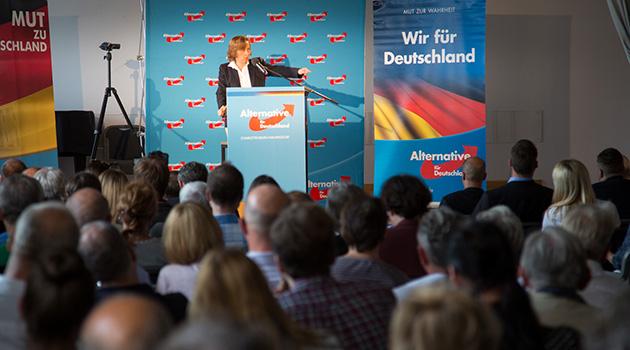Germany's anti-immigrant AfD party is radicalizing, some members are attempting to overthrow the chair

In recent weeks the clash between the conservative and the nationalist wings of the anti-immigration Alternative for Germany (AfD) pary has intensified. For now, the culmination of this conflict has been a challenge by more than 100 AfD politicians criticizing what they call the “cult of personality” around Björn Höcke – the head of the party cell in Thuringia who is known for his many radical remarks.
That critique was responded to by the Baden-Württemberg cell with a decision not to send the national AfD chair, Jörg Meuthen, who comes from the conservative wing, as a delegate to the party convention in November. The AfD began in 2013 as a party criticizing Germany’s adoption of the euro and ever-closer integration into the European Union, but as a consequence of the migration crisis of 2015, the center of gravity of its interest moved toward immigration and critiquing the refugee reception policy of Chancellor Angela Merkel (Christian Democratic Union – CDU).
In association with this shift, according to many observers – such as journalist Melanie Amman from Der Spiegel magazine – the party has moved significantly to the right over the last few years. That has been noticed by German counter-intelligence, which announced this year it would be reviewing whether AfD, the strongest opposition party in the country, should be followed as a whole.
In several states the AfD youth organization is already under surveillance, as are individual AfD politicians, on suspicion of activities that could subvert the democratic order of the country and its freedoms. The symbol of AfD approaching radical right territory is the 47-year-old boss of the AfD cell in Thuringia and president of the party’s faction in the state legislature there, Höcke, who, for example, previously called the Holocaust memorial in the center of Berlin a “monument of shame” or talked about Germany’s “stupid policy of overcoming [its Nazi past].”
At one point he was even in danger of expulsion from the party for those remarks. Today, however, such discussions are a thing of the past.
The internal party support for this politician, who likes to be celebrated by his followers, is, on the contrary, rising. Soon Höcke could be dangerous to the current leadership of the party as a whole, in which adherents of the conservative wing continue to predominate.
The degree to which Höcke bothers some conservatives is quite apparent from the challenge that has been signed by more than 100 AfD politicians this month, including three vice-chairs. The declaration criticizes Höcke for having exaggerated the cult of personality around him, for undermining intra-party solidarity, and for dividing the party by means of his criticism.
When, as the main representative of the nationalist right wing of the party, he raised the demand that he be allowed to speak for the entire party, his critics said it prompted suspicions that he is much more concerned about promoting his own wing than about the party as a whole. “The AfD is not and will not be Björn Höcke’s party!” the challenge says.
Although he has not signed it himself, Meuthen, AfD’s national chair, has expressed understanding for it. Last weekend Meuthen also made clear his agreement with AfD politicians who believe that if Höcke is so dissatisfied with the party leadership he should openly run for a leading post himself.
The reaction came swiftly. When Meuthen’s home cell in Baden-Württemberg was deciding whom to send as a delegate to the party convention this autumn, they voted against the 58-year-old politician, who paradoxically will now have no voting rights at the convention despite being the head of the entire party.
According to some party voices, that decision was taken to punish Meuthen for his criticism of Höcke. Disputes between the two wings of the party, are not limited just to the national level, but are also apparent within some state cells.
For example, the AfD in the northern state of Schleswig-Holstein is led by Doris von Sayn-Wittgenstein, a member of the nationalist wing whom the national leadership is doing its best to expel from the party. In the most populous state, North Rhine-Westphalia, the local AfD leadership has been absolutely disintegrated by disputes.
The November convention will indicate who will win this struggle for influence. The nationalist right wing could be strengthened if it wins the three elections to be held in the eastern states in September and October.
AfD and its right wing are much stronger in the east than in the west. It is estimated that more than 40 percent of the protest party’s supporters follow the Höcke group.
